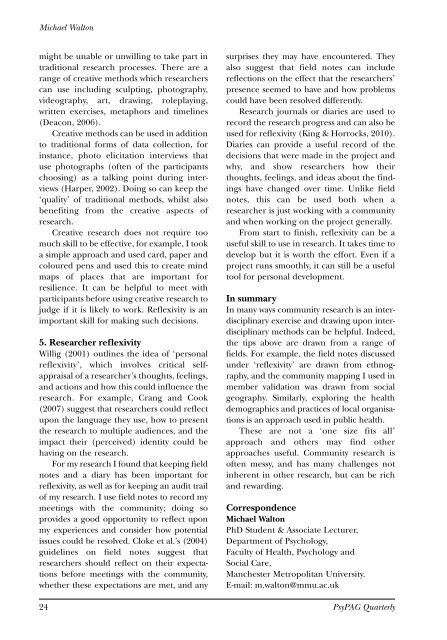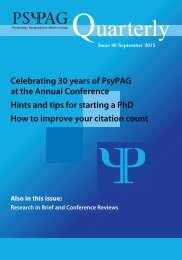Social Psychology Special Issue
XFCu7
XFCu7
Create successful ePaper yourself
Turn your PDF publications into a flip-book with our unique Google optimized e-Paper software.
Michael Walton<br />
might be unable or unwilling to take part in<br />
traditional research processes. There are a<br />
range of creative methods which researchers<br />
can use including sculpting, photography,<br />
videography, art, drawing, roleplaying,<br />
written exercises, metaphors and timelines<br />
(Deacon, 2006).<br />
Creative methods can be used in addition<br />
to traditional forms of data collection, for<br />
instance, photo elicitation interviews that<br />
use photographs (often of the participants<br />
choosing) as a talking point during interviews<br />
(Harper, 2002). Doing so can keep the<br />
‘quality’ of traditional methods, whilst also<br />
benefiting from the creative aspects of<br />
research.<br />
Creative research does not require too<br />
much skill to be effective, for example, I took<br />
a simple approach and used card, paper and<br />
coloured pens and used this to create mind<br />
maps of places that are important for<br />
resilience. It can be helpful to meet with<br />
participants before using creative research to<br />
judge if it is likely to work. Reflexivity is an<br />
important skill for making such decisions.<br />
5. Researcher reflexivity<br />
Willig (2001) outlines the idea of ‘personal<br />
reflexivity’, which involves critical selfappraisal<br />
of a researcher’s thoughts, feelings,<br />
and actions and how this could influence the<br />
research. For example, Crang and Cook<br />
(2007) suggest that researchers could reflect<br />
upon the language they use, how to present<br />
the research to multiple audiences, and the<br />
impact their (perceived) identity could be<br />
having on the research.<br />
For my research I found that keeping field<br />
notes and a diary has been important for<br />
reflexivity, as well as for keeping an audit trail<br />
of my research. I use field notes to record my<br />
meetings with the community; doing so<br />
provides a good opportunity to reflect upon<br />
my experiences and consider how potential<br />
issues could be resolved. Cloke et al.’s (2004)<br />
guidelines on field notes suggest that<br />
researchers should reflect on their expectations<br />
before meetings with the community,<br />
whether these expectations are met, and any<br />
surprises they may have encountered. They<br />
also suggest that field notes can include<br />
reflections on the effect that the researchers’<br />
presence seemed to have and how problems<br />
could have been resolved differently.<br />
Research journals or diaries are used to<br />
record the research progress and can also be<br />
used for reflexivity (King & Horrocks, 2010).<br />
Diaries can provide a useful record of the<br />
decisions that were made in the project and<br />
why, and show researchers how their<br />
thoughts, feelings, and ideas about the findings<br />
have changed over time. Unlike field<br />
notes, this can be used both when a<br />
researcher is just working with a community<br />
and when working on the project generally.<br />
From start to finish, reflexivity can be a<br />
useful skill to use in research. It takes time to<br />
develop but it is worth the effort. Even if a<br />
project runs smoothly, it can still be a useful<br />
tool for personal development.<br />
In summary<br />
In many ways community research is an interdisciplinary<br />
exercise and drawing upon interdisciplinary<br />
methods can be helpful. Indeed,<br />
the tips above are drawn from a range of<br />
fields. For example, the field notes discussed<br />
under ‘reflexivity’ are drawn from ethnography,<br />
and the community mapping I used in<br />
member validation was drawn from social<br />
geography. Similarly, exploring the health<br />
demographics and practices of local organisations<br />
is an approach used in public health.<br />
These are not a ‘one size fits all’<br />
approach and others may find other<br />
approaches useful. Community research is<br />
often messy, and has many challenges not<br />
inherent in other research, but can be rich<br />
and rewarding.<br />
Correspondence<br />
Michael Walton<br />
PhD Student & Associate Lecturer,<br />
Department of <strong>Psychology</strong>,<br />
Faculty of Health, <strong>Psychology</strong> and<br />
<strong>Social</strong> Care,<br />
Manchester Metropolitan University.<br />
E-mail: m.walton@mmu.ac.uk<br />
24 PsyPAG Quarterly



